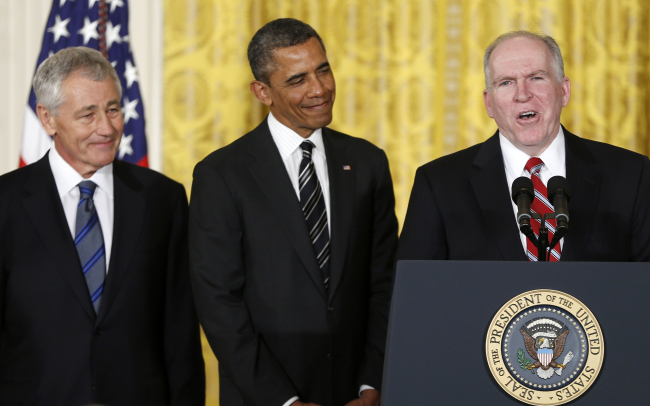Obama nominations raise prospect of more U.S. engagement with N.K.
Pyongyang’s behavior remains critical variable in new Obama team’s policy direction
By Korea HeraldPublished : Jan. 8, 2013 - 20:07
The prospect of Washington’s engagement with North Korea has increased as U.S. President Barack Obama has tapped two high-profile figures favoring diplomacy to head his foreign policy and security teams.
After nominating Democratic Sen. John Kerry as the new secretary of state on Dec. 21, Obama named former Republican Sen. Chuck Hagel on Monday to head the Department of Defense for his second four-year term.
Both Hagel and Kerry, who are Vietnam War veterans and foreign policy experts, have been among the leading voices calling for diplomatic negotiations to handle countries upbraided for their nuclear programs such as North Korea and Iran.
In 2002, Hagel took issue with then President George W. Bush’s branding of Iran, Iraq and North Korea as the “axis of evil,” suggesting that the provocative labeling would thwart any diplomatic efforts to enhance ties with them.
Kerry has frequently called for more U.S. engagement with the reclusive regime, indicating his opposition, to the Obama administration’s policy, which analysts dubbed “strategic patience.” In 2010, Kerry, who chairs the Senate Committee on Foreign Relations, said that strategic patience must not be allowed to turn into “strategic indifference.”
After nominating Democratic Sen. John Kerry as the new secretary of state on Dec. 21, Obama named former Republican Sen. Chuck Hagel on Monday to head the Department of Defense for his second four-year term.
Both Hagel and Kerry, who are Vietnam War veterans and foreign policy experts, have been among the leading voices calling for diplomatic negotiations to handle countries upbraided for their nuclear programs such as North Korea and Iran.
In 2002, Hagel took issue with then President George W. Bush’s branding of Iran, Iraq and North Korea as the “axis of evil,” suggesting that the provocative labeling would thwart any diplomatic efforts to enhance ties with them.
Kerry has frequently called for more U.S. engagement with the reclusive regime, indicating his opposition, to the Obama administration’s policy, which analysts dubbed “strategic patience.” In 2010, Kerry, who chairs the Senate Committee on Foreign Relations, said that strategic patience must not be allowed to turn into “strategic indifference.”

Should they be confirmed by the Senate, the two would play central roles in shaping Obama’s second-term foreign policy and defense priorities at a time when Washington is strengthening its strategic engagement in the Asia-Pacific amid large budget cuts.
Observers said that after all, how Pyongyang behaves would be the most critical variable in Washington’s policy direction. Obama has long stressed that “bad behavior” should not be rewarded.
“Should the North continue its provocative moves such as the recent rocket launch in violation of the U.N. resolutions, the U.S. would not be able to take an independent action out of the boundary of the international organization. That is one restraint,” said Nam Chang-hee, political science professor at Inha University.
“Another variable is how the new Seoul government would move in relations with the North. If there is a period of a thaw in their ties, Washington would have more room to take more engagement with Pyongyang in coordination with its ally South Korea.”
Given the support both from the Republicans and Democrats, Kerry is likely to sail through the confirmation process. But Hagel, called a “Republican maverick,” faces a nomination battle with his foes denouncing him for being insufficiently supportive of Israel and soft on Iran.
Hagel was an outspoken opponent of the war in Iraq and the troop increase in the battle zone, which irked his fellow party members. He has also backed the peace process in the Israel-Palestine conflict and a two-state solution to put an end to it.
His 2008 reference to U.S. supporters of Israel as the Jewish lobby has repeatedly surfaced, fanning a sense of antagonism against him. His foes accused him of holding an “anti-Semitic” stance.
But observers forecast that despite such criticism against him, Hagel would take the helm of the Pentagon as Obama is determined to stave off another nomination fray following the case of Susan Rice. The U.S. ambassador to the U.N. withdrew from contention for the top diplomat post last month over Republicans’ denunciation over her handling of the Benghazi consulate attack.
By Song Sang-ho (sshluck@heraldcorp.com)
-
Articles by Korea Herald



![[Exclusive] Korean military set to ban iPhones over 'security' concerns](http://res.heraldm.com/phpwas/restmb_idxmake.php?idx=644&simg=/content/image/2024/04/23/20240423050599_0.jpg&u=20240423183955)



![[Herald Interview] 'Amid aging population, Korea to invite more young professionals from overseas'](http://res.heraldm.com/phpwas/restmb_idxmake.php?idx=644&simg=/content/image/2024/04/24/20240424050844_0.jpg&u=20240424200058)


![[Pressure points] Leggings in public: Fashion statement or social faux pas?](http://res.heraldm.com/phpwas/restmb_idxmake.php?idx=644&simg=/content/image/2024/04/23/20240423050669_0.jpg&u=)









